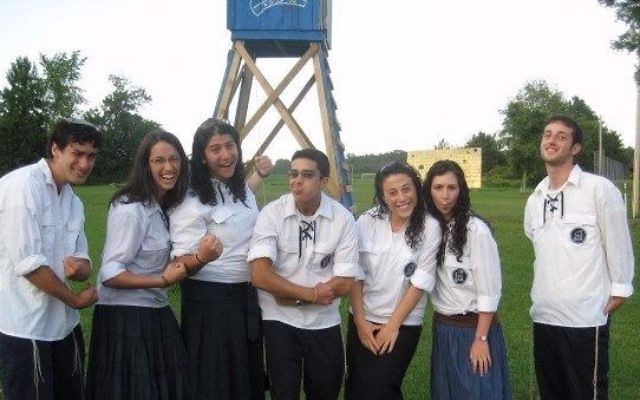I still have not gotten situated to the long s of the summer. For sixteen summers, I was immersed in the beauty that is Camp Stone. At camp I looked at my watch not in anticipation of when Shabbat would end, but rather to see how many precious minutes of this beautiful time still remained. Camp was an environment in which I felt empowered as I thrived as a person; a Jew and a woman. It was a place where, at the age of thirteen, I could be entrusted with the welfare of my plugah, my fire pit work crew, at the machaneh chutz, the two night camping trip. By fifteen, I was carrying a canoe, without assistance, for over a mile on a week-long canoe trip. It was the place where, at the age of nineteen, I cared for campers as if they were my own. Despite my numerous positive experiences, I clearly remember serving as the Sganit Rosh Moshava, second-in-command at camp if you will, and leading an educational activity.
Overall, I found my job that summer to be invigorating. I was working with staff and campers, creating programming, solving problems and building relationships. There was one moment, however, that I will never forget. That young blonde haired girl, soon to enter sixth grade, mentioned that a woman could not be a Rosh Moshava, a head of camp. Although her statement was irrelevant to the educational conversation about prayer, her words lit a fire in me. She may not have even been born during the years that Ellie Schreiber and Estee Eisenberg had enthusiastically taken on the role. Truth be told, in nearly forty years of camp, only two women, in comparison with upwards of fifteen men, held the title of “Rosh Mosh.” A couple of years later, then serving as a woman Rosh Moshava, I winked at the camper, now entering eighth grade, as her bus pulled into camp.
This camper’s words made it clear to me that I had an opportunity to show her that camp is a place without glass ceilings. That it truly was a coincidence that the role of Rosh Moshava had been held by men in in the 2000s. Since 2008, two more women have stepped up to the plate as Rosh Moshava at Camp Stone. My serving as Rosh Moshava was only a piece of the puzzle.
Those in the camping world often describe camps with utopian language. Camps are set in remote locations allowing distance from the ‘negative’ influences from general society. While camp is an opportunity to negate gender stereotypes, it is also a place where stereotypes can be strongly reinforced. For example, while a healthy body image can be difficult to maintain with television, the fashion world, magazines and other media, camps can choose to allow such magazines into camp or they can create a culture where conversation about one’s weight is taboo. Camps, and the general community, need to take this powerful responsibility in. Camps can serve as catalysts for change.
I encourage camps to push further, past the obvious goals of ridding our youth of sexism. Camps can be the place to reinforce or reinvent norms and rituals of the Orthodox Jewish community. Camp is a place where girls sweat, get covered in mud, can let their hair and guard down and be anything but ladylike. Research has demonstrated this truth since the early twentieth century. What is special about camp is that the unique setting makes a woman saying kiddush on Friday night, for example, normative or mainstream within the Orthodox camp community. Why is that the case? Because camp administrators create a culture and what they say goes. I appreciated the way that Fleischmann, former Rosh Moshava, put it while addressing camp staff. He explained that it does not matter if you fit in, what you are like at home, or what is popular outside of camp. Inside of camp, he enthusiastically expressed, “You define ‘cool.’” The camp administration trains camp staff in understanding camp values in such a way that staff can transfer those values to campers. It does not matter what is ‘cool’ back home, inside of camp, it is a whole new game. What may be considered questionable or controversial at a synagogue is the standard in camp.
What makes camp critical in effecting long term change, is when campers and staff bring their camp experiences to their home communities and question the status quo. Camp is a place where gender equity, gender balance, and inclusion of women in ritual have the most potent impact. The beauty of camps, in contrast with other settings, is that school and synagogue politics do not factor into decisions. When potential areas of improvement are identified, action can be taken expeditiously. Camp decisions are based on chinuch, on the welfare of the campers, resulting in an environment that is willing to listen and adapt to best meet the needs of our daughters, our future.



